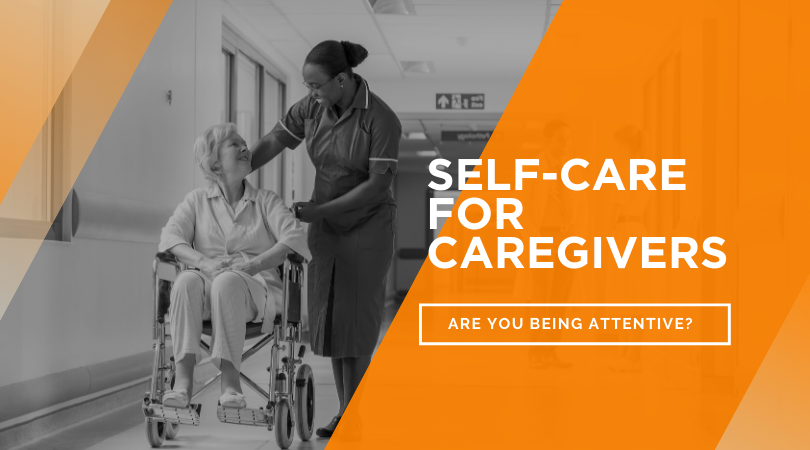Whether you’re a caretaker, healthcare worker or the owner of a caregiving facility—read on for important tips from people who truly understand.
For many reasons, those working in caretaking professions—from nurses and doctors to facility managers and home health aides—have it tough. The task of caring for others is not an easy one by any measure; and many people just aren’t cut out to do what caretakers are able to do regularly.
There’s a reason that terms like “caregiver syndrome,” “caregiver burnout” and “compassion fatigue” exist. A day spent caring for someone else can be filled with rewarding moments…but also with extreme stress and exhaustion. Some good advice from seasoned professionals can go a long way. Here are seven of the top insights I hear again and again when talking with those in caretaking careers:
1. See your patients for who they were, not for who they are now.
Patients in need of caretaking are often older individuals. When working with senior citizens, try to see them as they were in their prime. Walking into the room with a 90 year old gentleman, for example, might make it easy to see only that: an old gentleman in need of assistance. But that older man was once a young man with hopes and dreams very much like yours. He may have served in the Navy, coached a little league team or longed for a lost love. Seeing your patients for who they were can help you better understand them, and to connect with them on deeper levels. Ask family members for stories or look around at old photos and mementos to gather information. When you look at a 90 year old face, try to see all of the other years in there as well.
2. Take time to give care to yourself.
You probably hear this one all the time, but it’s easy to get so wrapped up in caring for others that you forget to give yourself the same courtesy. If you don’t take good care of yourself, you can’t be a good caretaker for others. It’s critically important to carve “me time” out of your days where and when you can, and to make room for all of the things that you enjoy during your downtime. Self-care has amazing benefits. By prioritizing a few simple things, you can make it a part of your regular routine.
3. Seek out support from those who have walked a mile in your shoes.
There’s no support like support from other people who truly understand. Consider joining a chat group with others who share your profession and work with similar patients, or reach out to someone in your company to request regular pep talks and debriefs. If you make a quest out of finding others who have walked your path and who can listen well (whether in a closed, private Facebook group or an in-person support meeting,) you’ll greatly benefit.

4. Like in every relationship, communication is key.
Sharpen your communication skills…and work on consistently polishing them to keep them strong. It may not always be possible to use them with patients, but you can usually use them with coworkers, friends and support systems. Good communication during caregiving not only ensures a better experience for the patient, it also provides a new level of confidence and security for you. While every circumstance brings a different best-case scenario, reviewing communication tips for caregivers and practicing getting out frustrations rather than holding them inside are always great places to start.
5. Don’t “time travel.”
Rather than stressing about things that happened with patients in the past or worrying about what could happen in the future, stay in the present moment while working. Take one day at a time. If the things you have planned for that day don’t all get done, life will go on. Staying in the “now” will help ease your stresses and increase your happiness. If you feel your mind starting to “time travel” (by thinking back to something that bothers you or thinking ahead with concern,) gently bring it back to the present moment. Repeat this process until it becomes a habit.
6. Breathe to bring patience into the picture.
No matter what you do, you are certain to experience difficult days. Throughout your caretaking experience, you can count on the fact that there will be ups and downs. When you’re having a hard time and you need a moment, remember that there is a lot of power in simply taking a deep breath. Experienced caregivers say that breathing through the bad not only paves a pathway for patience to enter, but clears away chaos and helps you to think more clearly.
7. Don’t forget to laugh.
Many caretaking moments can be heavy, so don’t forget to treasure the light ones that bring laughter into your life. There’s a reason that people say “Laughter is the best medicine.” It releases endorphins, encourages social bonds, fosters connectivity in the brain, helps protect your heart and acts as a natural antidepressant. Funny moments may come rarely in your profession, so take advantage of them when they do. Don’t be afraid to let go, get silly, laugh at yourself or tease your team members. A good giggle is one of your very best stress-fighting tools.
The care that you give every day is critical for others. Whether you work for a hospice, home healthcare agency, senior apartment, personal care home, retirement community, facility for assisted and independent living, short-term rehab or skilled nursing facility, the world is a better place with you in it! It takes a very special person to do what you do, and you touch many lives every day. For all of these reasons and more, it’s important for you to be able to operate at your best. Use these simple but powerful pieces of caretaking advice to increase your professional success and happiness—and to keep on making an incredible difference.

Lindsey Elias, Marketing
As our Marketing Content Manager, Lindsey is passionate about producing quality content. When not at the office or planning her next Disney getaway, she loves hanging with her husband, family and fur babies and indulging in the two c's: carbs & coffee.
DISCLAIMER
The information contained in this blog post is intended for educational purposes only and is not intended to replace expert advice in connection with the topics presented. Glatfelter specifically disclaims any liability for any act or omission by any person or entity in connection with the preparation, use or implementation of plans, principles, concepts or information contained in this publication.
Glatfelter does not make any representation or warranty, expressed or implied, with respect to the results obtained by the use, adherence or implementation of the material contained in this publication. The implementation of the plans, principles, concepts or materials contained in this publication is not a guarantee that you will achieve a certain desired result. It is strongly recommended that you consult with a professional advisor, architect or other expert prior to the implementation of plans, principles, concepts or materials contained in this publication.
This blog post may contain the content of third parties and links to third party websites. Third party content and websites are owned and operated by an independent party over which Glatfelter has no control. Glatfelter makes no representation, warranty, or guarantee as to the accuracy, completeness, timeliness or reliability of any third party content. References to third party services, processes, products, or other information does not constitute or imply any endorsement, sponsorship or recommendation by Glatfelter, unless expressly stated otherwise.
Related posts
The challenges that caregivers face are not easy. We compiled some quick tips for managing family interactions in hospice and palliative care settings.
In summer 2024, weather will be unpredictable, but these are the weather events you can expect, depending on location.
There's so much to learn about nursing, but here's 10 fascinating facts as we celebrate National Nurses week.








Submit a Comment